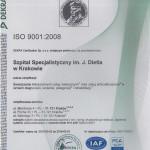On 29 December 2013 the J. Dietl Specialist Hospital in Kraków has positively passed the accreditation visit and obtained a CERTIFICATE OF ACCREDITATION given by the Minister of Health. The hospital gained as much as 90% of the points which gives us the 14th place in Poland. At 1409 hospitals registered in Poland, the certificate of accreditation was given to only 155 hospitals. In Lesser Poland there is 90 hospitals, but only 14 have the certificate, while in Kraków only 7 received the certificate (data as at 18 August 2014).
Obtaining the Certificate of Accreditation by the hospital guarantees the high quality of services for patients as well as their safety.
Accreditation is the most widely proven in the world and the most effective way to improve the level of services and safety of patients. It is a system of mechanisms aiming at reducing the risks associated with the patient’s stay in hospital. Implementation of accreditation standards by the Hospital is periodically checked by the Center for Monitoring Quality in Health Care – an independent, external institution established for this purpose by the Minister of Health. The evaluation is carried out according to measurable criteria of evaluation identical for each of the hospitals. Therefore, it is possible to compare the level of compliance in relation to other institutions. Our hospital received a very good position among accredited hospitals.
The J. Dietl Specialist Hospital in Kraków has implemented a quality management system according to standard ISO 9001-2008. The institution obtained the Quality Certificate twice, in terms of stationary medical services and outpatient services within diagnostics, treatment, care and rehabilitation.
First accreditation was held on 4 January 2010, next – in February 2013. The present certificate is valid until 1 March 2016. The main requirements of ISO 9001 are, inter alia, introduction of supervision over documentation and records, involvement of the management in building of quality management system, systematization of resources management, the establishment of product realization process, carrying out systematic measurements (customer satisfaction, products, processes).
All of these requirements are described in details in this standard and include eight principles of quality:
- Enhanced customer orientation resulting in an increase of satisfaction
- Management of organization develops its prospects
- Involvement of employees and increase in their motivation
- Process approach – the effectiveness and efficiency of the organization depend largely on the quality of the processes implemented within
- System approach to management
- Continuous improvement
- Factual approach to decision making
- Creating mutually beneficial relations with suppliers of materials and services gives the organization a guarantee of high quality.





